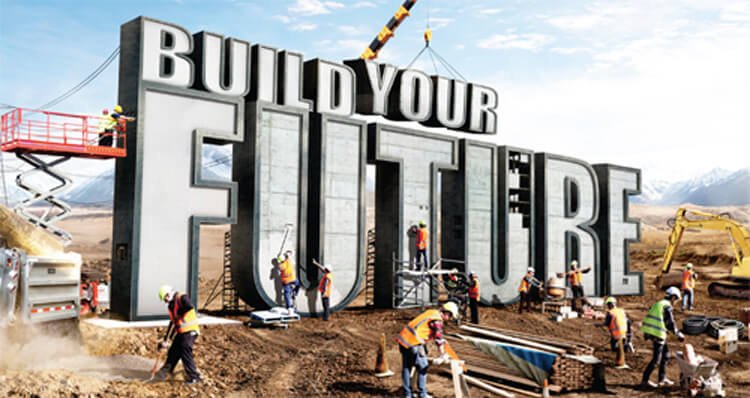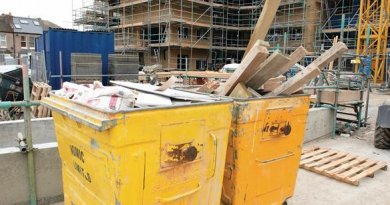Why a Career in Construction Can Be the Stepping Stone You Need
Generally, when you hear the term “entry-level job,” you’d think that it’s a position that young professionals right out of college or with limited experience would easily qualify for. However, according to one study, entry-level jobs are increasingly defined by pay–and not necessarily by experience. For example, Talent Works recently analyzed nearly 100,000 job postings and found that more than half of all the full-time, entry-level jobs available required at least three years of professional experience in the specific field.
Chalk it up as part of a trending “entry-level job conundrum,” where requirements are increasing for such positions, even when salary is not. Money aside, many recent graduates are finding it difficult to even get in the short stack of resumes for many of these entry-level job openings due to their lack of experience in such fields.
So what’s a young graduate to do? Sure, they could burn themselves out with internships to cut their teeth, but who’s to say that’s going to pay the bills (let alone provide benefits like medical and dental insurance)? Freelance is another option, but it can be a grind–not to mention stressful–scrapping for work.
But there is one exciting and growing field where it’s possible to get an entry-level job and gain experience starting today: construction.
This post will take a closer look at how construction work helps break the aforementioned entry-level job conundrum, while also offering a satisfying, honorable and lucrative career. Why choose a career in construction? Here’s why:
Construction Is a Career You Can Begin Today
One of the most attracting features of the construction industry is the wide range of opportunity it offers. Currently, construction expenditures are nearing $1.4 trillionglobally. What’s more is there’s a need for workers to complete this work. According to U.S. News, U.S. employers were striving to fill about 225,000 construction jobs each month in 2018, largely thanks to the booming economy giving way to new projects.
But there isn’t just opportunity to get into the construction industry; there’s also the unique chance to chart your own course after you gain some experience. Perhaps you start by catching on with a local building crew in your hometown and “learn by doing” the basics, then move on to a specific aspect of construction, or work your way up to a project manager or foreman.
There’s also various sub-sectors of construction that make for attractive careers, such as those in plumbing, electrical work, wind turbine installation and maintenance, solar energy, masonry work, ironwork and even construction technologists.
Don’t ‘Open Doors,’ Build Them
Aside from the opportunity that construction work offers professionals, it’s also an ideal field to get involved with if you one day would like to transition to another career. This is primarily due to the mix of soft and hard skills that professionals attain when working in the field. Best of yet, getting your start within construction helps you easily beat the entry-level job conundrum you might face without this valuable experience.
While this is not a comprehensive list of the extensive range of skills it’s possible to gain within the building sector, some of the more significant soft skills include:
- People skills: When you’re on a construction job, you’re not only working as part of a team, but you’re also often interacting with homeowners, tenants, building owners and others to keep them informed of hazards, progress and any other information pertaining to the project. Learning how to speak and communicate with people can help make a transition into sales, marketing or even starting your own business that much more seamless.
- Leadership: Just as you’re able to hone your people skills, construction jobs also give you the opportunity to develop and sharpen leadership skills. Leadership is something that every industry strives for, especially when it comes to management positions.
- Discipline: When it comes to construction work, doing something “good enough” isn’t going to cut it. Things need to be done correctly, or else you could wind up compromising part–or all–of the job. But that’s part of the beauty of working in construction, having the discipline to complete every task by the book and to industry standards on a jobsite.
- Critical thinking: Finally, no construction job comes without its share of issues that need to be resolved. While all jobs strive to go precisely “by the book,” that’s hardly the case. In many cases, there’s the weather to contend with, issues with materials or measurements or other unforeseen obstacles along the way. When the going gets tough, construction work helps people think critically on how to troubleshoot. And we shouldn’t need to tell you how valued critical thinkers are in society these days.
In addition to the soft skills, construction work also helps instill some good hard skills as well, including:
- Technical know-how: Construction work is increasingly becoming more tech-savvy, whether it’s using drones to measure sites from the sky, or storing plans and other documentation to the cloud from mobile devices. Technology isn’t just fun to learn and use, but it can also streamline productivity and help you gain a whole new set of skills that you otherwise wouldn’t have had. These tech skills can translate to practically any other industry.
- Math: You’ve heard the old saying, “measure twice, cut once,” right? That alone should give you an idea of just how much math is involved in construction work. In reality, there’s a lot more than what initially meets the eye, and this is another great skill to have in your repertoire. Most companies place a lot of value on professionals that can do basic math quickly and accurately.
Aside from the soft and hard skills that you’re likely to gain from construction work, another fringe benefit to a career in construction–whether you stay in the industry or transition out of it–is just knowing to perform a lot of household projects and maintenance yourself. Acquiring the skills and performing the work on your home yourself sure beats the costs of hiring a contractor to do it for you.
7 (Underrated) Reasons Why You Should Choose a Career in Construction
If the current opportunity in the industry and all the skills you’re likely to attain still isn’t enough to entice you to learn more about a career in construction, then perhaps the following seven reasons will be. Many of these reasons we considered underrated from the standpoint of starting a career in the field, but they’re all excellent:
1. The opportunity to travel
Construction work isn’t necessarily tied to your specific city, county or state. If you work for a bigger company, you may have the ability to travel out of state to under-contract project sites.
What’s more is that with such a high demand for skilled labor, you’ll be able to travel to where the jobs are and where the most need is. This is the case both for experienced construction workers and for new self-starters. Finally, construction professionals also have the option to gain new insights and learn new skills by traveling to the various trade shows that are held annually.
2. Never get bored
Say goodbye to the grind of the 9-5 workday. Construction work holds a new challenge every single day and offers a nice alternative to the monotonous office job. Of course, the job isn’t always easy and can be high stress. But it’s also highly rewarding, which can help make it all the more enjoyable when a project comes together. When you factor in this and all the great skills you’ll be acquiring, construction work is far from boring.
3. It pays well
Even as an entry-level apprentice, you can expect to make a fair starter’s salary and have benefits such as healthcare, vision, dental and paid time off. Then, of course, your earning potential is only going to increase as you gain more experience and work your way up the ladder. Chew on this statistic for a second: The average hourly wage for construction workers is up more than 25% since 2006.
4. The industry is getting more high-tech by the day
We already talked about how technology is helping to shape the future of the construction industry, which makes it a great career path for someone interested in IT, yet not willing to invest in the education to facilitate such a career. High-tech in construction isn’t just shaped by the aforementioned drones, mobile devices in the field and cloud computing, however. Even new-age technologies like 3D printing have the potential to revolutionize construction down the road.
5. It’s getting more and more sustainable
Here’s something you may not realize about the construction industry: It’s getting greener and greener. Today, the green building market is valued at about $81 billion, with home and building owners desiring buildings that use less energy. Consider this: In 2006, only about 300 buildings in the United States were LEED-certified projects. At the end of 2017, this number increased to 65,000. Yes, the construction sector has great potential to help create a more sustainable world, and by forging a career in construction, you can help blaze this trail too.
6. You can let your creativity shine
If you think construction work is void of creativity, then you’re wrong. In fact, construction work–in everything from masonry to the design team–is a great way to let your creativity shine. The avenues to express your creativity in construction are plentiful.
7. You can learn from the best
The construction industry isn’t just composed of professionals who are diverse, hardworking, talented and insightful but those who are more than willing to share what they’ve learned with the next generation of workers. The construction industry is a tight-knit one, where professionals typically look out for and do what they can to help one another. Whether it’s an experienced 40-year veteran to a young up-and-comer, you can learn something from just about anyone in the industry, just so long as you’re willing to listen.
How to Learn More About Starting a Construction Career
If you’re convinced that you should choose a career in construction, or at least start considering one, there are plenty of avenues to explore your options. The best thing you can do to understand if it’s right for you is to talk to people who are part of the industry. If you’re in high school, your school might offer events or career days that host professionals from the industry. For instance, a Philadelphia high school recently brought in a professional from construction technology firm, PlanGrid, to co-present with a member of the General Building Contractors Association (GBCA) and a union carpenter from Keystone Mountain Lakes Regional Council of Carpenters. Together, they spoke with high school students about the opportunities in construction, including technology companies like PlanGrid.
Source: Plangrid




